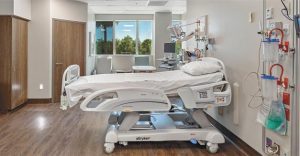 Seconds count, especially during a heart attack. The risk of damage to the heart increases as time passes without treatment. Naples area residents can now find around-the-clock treatment for heart attacks at two Physicians Regional Health System hospitals.
Seconds count, especially during a heart attack. The risk of damage to the heart increases as time passes without treatment. Naples area residents can now find around-the-clock treatment for heart attacks at two Physicians Regional Health System hospitals.
“Providing cardiac access for our community, whether North Naples or Marco Island, is vital,” said Mary Minix, service line administrator for cardiac services at Physicians Regional. “Now that we offer around-the-clock heart attack care, patients no longer need to experience extended transport times when seconds count. Physicians Regional is now your nearest heart attack receiving facility.”
Physicians Regional – Pine Ridge opened the Heart Center in July 2020 which allows patients to receive a full range of cardiology procedures. The Heart Center, a 24/7 heart attack receiving facility, includes a dedicated cardiovascular intensive care unit for open heart surgery patients and a new recovery space for cardiac and interventional patients. Located in the hospitals newly renovated second floor, the center contains two operating rooms, three cardiac catheterization labs, five intensive-care beds and 15 beds for pre- and postoperative care.
Physicians Regional Heart Center services include:
• Coronary Artery Bypass Surgery
• Balloon Valvuloplasty
• Thoracic Surgery
• Valve Surgery
• Cardiac Catheterization
• Internal Cardiac Defibrillator Placement
• Pacemaker Implantation
• Percutaneous Coronary Intervention (PCI)
• High-risk Electrophysiology Ablations
• Structural Heart Program: Watchman and TAVR
Physicians Regional Collier Blvd. and Physicians Regional Pine Ridge campus are now a 24/7 heart attack receiving facility. This means both campuses will be providing around-the-clock treatment for patients experiencing chest pain and other cardiac emergencies. Working in coordination with Collier County EMS and local first responders, the physicians and staff at Physicians Regional will expedite the diagnosis and treatment of all cardiac emergencies.
The goal is to have a patient receiving comprehensive treatment within 90 minutes of paramedics’ arrival – a timeframe known as the Door-to-Balloon Golden Rule, for restoring blood flow in the blocked arteries.
You are never too young, or too old, to take care of your heart. Preventing heart disease is one of the key factors to keeping your heart healthy, and with February being Heart Health Awareness Month, now more than ever, it is vital to raise awareness and be informed about heart health.
Physicians Regional Cardiologist, Dr. Sarah deLeon Mansson says, “The foundation of cardiovascular treatment is exercise and adopting a more heart healthy diet. By incorporating stress reduction techniques such as yoga & meditation, along with the latest diagnostic and therapeutic regimens if necessary, my office provides a space for patients, both men and women, to be treated with this whole person approach.”
Some of these healthy habits include maintaining a healthy weight, sustaining healthy sleep habits, and refraining from smoking. Additionally, eating a healthy diet that is low in saturated fat, cholesterol, and salt, staying away from refined carbohydrates, and exercising 30 to 60 minutes most days of the week, can be beneficial as well.
According to the American Heart Association the facts below are key to keeping a healthy heart:
• Watch your numbers closely: With age comes increased risk for heart disease, and your blood pressure, cholesterol, and other heart-related numbers tend to rise.
• Watch your weight: As you grow older your body needs less calories. Excess weight will strain your heart because it is working harder to keep up, this increases your risk for heart disease, high blood pressure, diabetes, and high cholesterol. Exercising regularly and eating smaller portions of nutrient rich foods can help maintain a healthy weight.
• Know the signs: Heart attack symptoms in women can be differ from those in men. Knowing the signs of a heart attack or stroke makes it more likely you will receive care in a timely manner. Acting fast can save your life and prevent serious disability.
• Manage your stress: We all have stressors in our lives. Whether it be at work, home, or in our day to day interactions in life, stress is inevitable. However there are many ways to combat and manage stress in your life.
• Count to 10 before you speak or react. Taking the time to think through your response to a stressful situation can help you make an informed decision about what you want to say and even help find a resolution
• Take a break. Going for a walk, walking the dog, listening to music or a podcast can help take your mind off of stress
• Exercise. Working out your aggression or stress is not only great for your mental health, but for your physical health as well
• Take time for a quick meditation or mindful moment
• Sleep on it, if it is not urgent it can be very helpful to take a beat and make a decision after a good night’s rest
• Remove yourself from the stressful situation. Physically removing yourself from a situation that is causing stress can help reduce stress immediately and help prevent further tension/conflict
The heart is one of the most important muscles in the body, yet over 84 million Americans suffer from a form of cardiovascular disease. You could be one of them if you don’t seek care fast. Whether you need acute emergency treatment due to a heart attack or have a chronic heart condition that requires continued care, Physicians Regional Healthcare System has cardiologists close to your home.
To schedule an appointment with a cardiologist please call (855) 85- GREAT or visit PhysiciansRegionalHeartCare.com.









